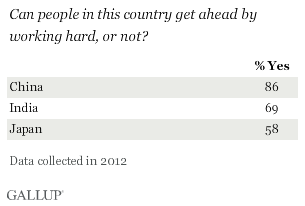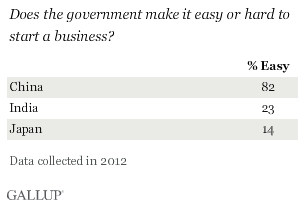After Gallup opened its first offices in China about 20 years ago, we decided to conduct a nationally representative survey of the Chinese population covering a wide range of issues. One of the questions asked respondents to choose one of six statements that best described their attitude toward life, with the options ranging from a capitalistic attitude to a socialistic attitude. The item representing a capitalistic viewpoint was the simple statement, "To work hard and get rich."
More than 60% of the respondents in China said in 1994 that their attitude toward life was "to work hard and get rich," and it has remained above 50% in China each time Gallup has asked the question since then. In a similar survey conducted by the Japanese government in 1993, 17% of respondents said their attitude toward life was to "get rich." Gallup also asked this question periodically in India. In 1996, 48% in India said working hard to get rich was their attitude toward life. By 2009, 35% of Indians said this statement represented their attitude toward life. There were times in the early 2000s that the views of those in India and China were more closely aligned, but as of 2009, adults in the two countries held divergent attitudes.
The conclusion I arrived at 20 years ago -- and still believe today -- is that China, where "work hard and get rich" is an ethically Chinese value, is capitalistic in its collective soul. On the other hand, in Japan -- a country with a capitalistic economic system -- most people don't have the same work hard, get rich attitude. Further, although 20 years ago many business leaders postulated that India would be the dominant economic power, it is possible that China has experienced more economic growth than India - because residents of China are more likely than residents of India to wake up every day trying to work hard and get rich. These differences could be part of the reason why China passed Japan a few years ago to become the country with the second-largest economy in the world, and why China continues to distance itself from India in terms of economic growth.
Residents of China are also more likely than those in India and Japan to believe that their environment is conducive to capitalistic values. Eighty-six percent in China felt that people could get ahead in their country by working hard in 2012, compared with 69% in India and 58% in Japan.
Most Chinese residents also feel that their government's policies support entrepreneurship, a key pillar of capitalism. In 2012, 82% in China said the government makes it easy to start a business, compared with 23% in India and 14% in Japan. These data indicate that China's environment allows its collective capitalistic soul to flourish, while the economic environments in India and Japan are not as conducive to supporting capitalism.
Together, these data suggest that China is actually an extremely capitalistic society with an economic system that strongly supports that ethic. This lifelong Asia watcher thinks that is exactly the case.

